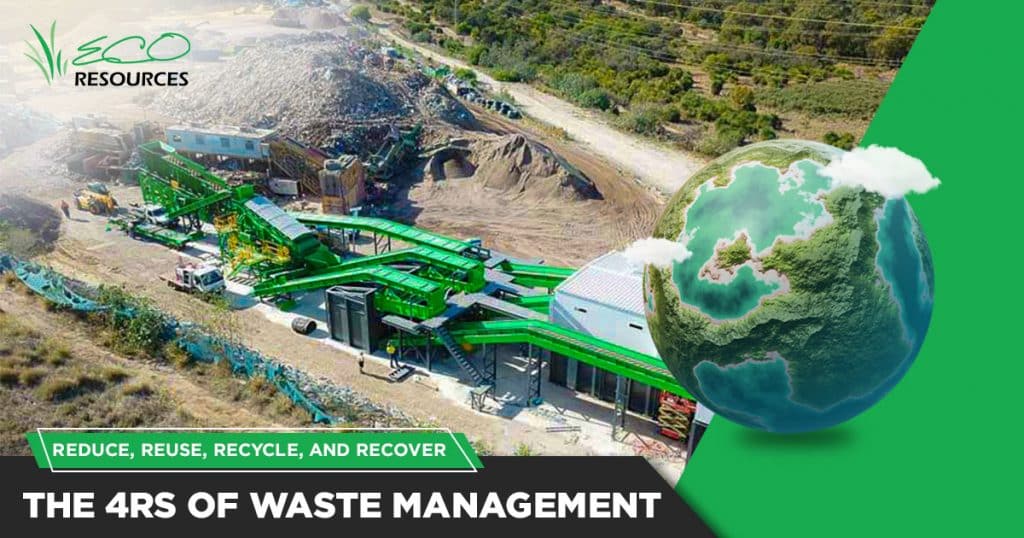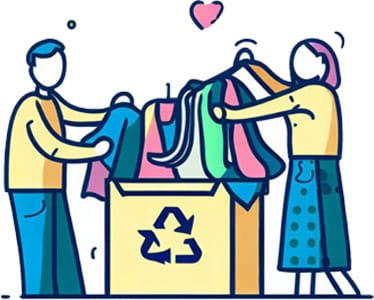

Taking care of our planet is something we should all be a part of, and understanding waste management is a good starting point. If you’re wondering what the 4Rs of waste management are and how they can help keep our world clean and green, this article is just for you.
The 4Rs stand for Reduce, Reuse, Recycle, and Recover. These four simple actions can help us create less waste, use our resources smartly, and keep our environment cleaner.
“Reduce” is our first ‘R’, and it’s all about using less. By consciously choosing to use fewer resources, we create less waste. This doesn’t just mean buying fewer things – it’s also about making choices that naturally lead to less waste.
For instance, choosing a digital receipt over a paper one, or opting for loose fruits and veggies instead of those wrapped in unnecessary plastic. Even small actions, like turning off the lights when we leave a room, can help reduce waste in the form of energy.
When we follow the principle of “Reduce,” we actively participate in decreasing the demand for new products and resources. Every time we opt for a reusable grocery bag instead of a plastic one, or choose to repair an appliance instead of buying a new one, we are helping to decrease the extraction of new resources from our planet.
“Reuse” is our next ‘R’, and it encourages us to give our items a second life before thinking about throwing them away. Many items around us can have more than one use. Reusing helps save us money and reduces waste.
“Reuse” is not just about using an item more than once, it’s also about extending the life of products and preventing them from going to the landfill prematurely.
For example, donating clothes or household items we no longer need or repurposing an old ladder into a bookshelf can help reduce the overall waste we generate. An old t-shirt can turn into a cleaning cloth, a glass jar can become a container for bulk foods, or a worn-out ladder can transform into a unique bookshelf.

Our third ‘R’ is “Recycle.” When we can’t reduce or reuse, the next best thing is to recycle. Many of the items we use daily, like paper, plastic, glass, and metal, can be transformed into new products.
Recycling helps keep valuable materials out of the landfill. It’s important to remember that not all waste is recyclable. So we need to learn about our local recycling programs to recycle correctly.
Recycle is about giving a new life to the materials that make up the products we use. By recycling paper, plastic, glass, or metal, we reduce the need for new materials, save energy in production processes, and reduce greenhouse gas emissions.
Moreover, recycling prevents these materials from ending up in landfills where they can take hundreds, or even thousands, of years to decompose.
The final ‘R’ stands for “Recover.” Sometimes, even after reducing, reusing, and recycling, there can still be waste left. Recovery is about extracting value from this remaining waste.
For example, organic waste like food scraps and garden cuttings can be composted at home to create nutrient-rich soil. Some waste can even be used to create energy in waste-to-energy plants.
Recover allows us to take the process a step further. It involves getting the absolute most out of products, even after they’ve been reduced, reused, and recycled.
Following the 4Rs – Reduce, Reuse, Recycle, and Recover – is a simple way for us all to make a big impact. They help us use our resources wisely, create less waste, and contribute to a cleaner environment.
Each ‘R’ offers a different way to manage waste. Together, they give us a comprehensive approach to waste management that anyone can follow. When combined, they provide a complete and comprehensive approach to waste management that not only minimizes our waste but also maximizes the value we get from resources.
In an era where our planet’s health is under significant issue, implementing these 4Rs is no longer a choice but a necessity. They offer simple yet powerful ways for us all to contribute to a cleaner and greener environment.
By adopting these practices in our everyday life, we’re playing a crucial role in safeguarding our planet for future generations.
The 4Rs of waste management – Reduce, Reuse, Recycle, Recover – offer an effective and manageable strategy for everyone to deal with waste. If we each play our part, these 4Rs can help us make our world a healthier and cleaner place for future generations.
If you’ve found this article helpful, don’t forget to share it with others. Each small action can make a big difference when it comes to caring for our planet. So, let’s start with these 4Rs and work together to build a sustainable future.

Kristy Sumich is the owner and director of Eco Resources, a prominent waste management and recycling service in Western Australia. With deep industry knowledge and hands-on operational experience, Kristy is dedicated to providing sustainable solutions in waste management.
All rights reserved © Eco Resources. Website by Selling Online Made Simple. Sitemap.